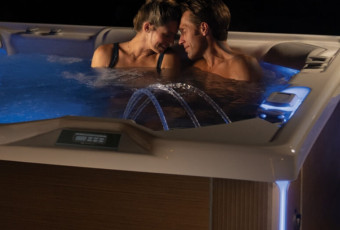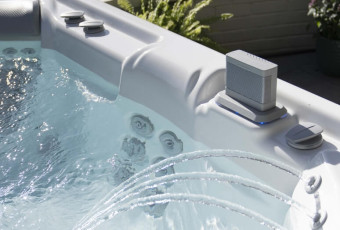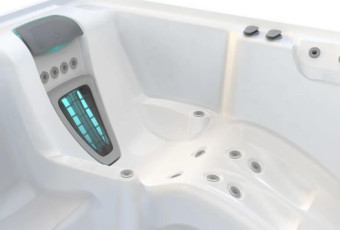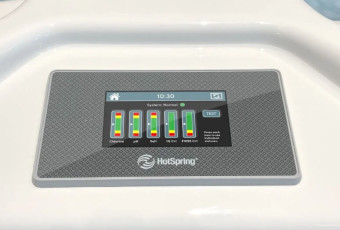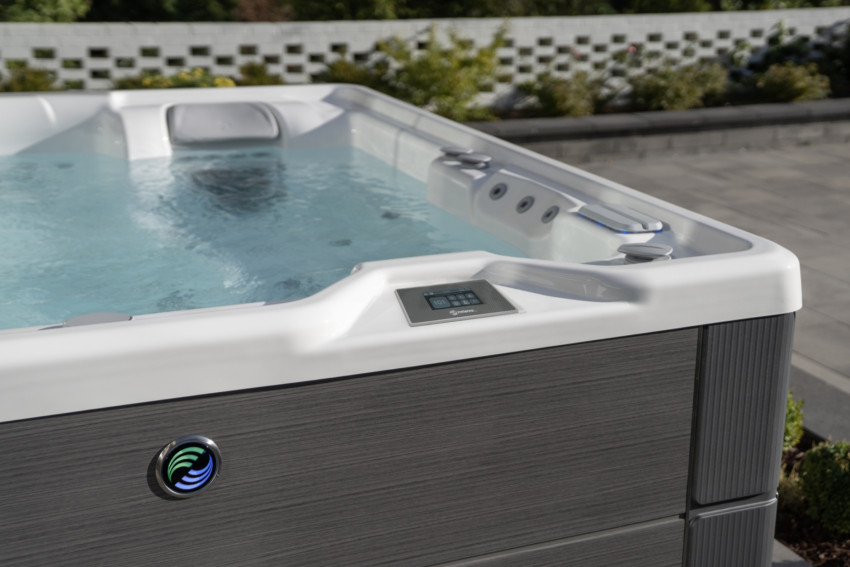So, you've decided to buy a spa pool—congratulations! You're about to enter a whole new world of luxury, wellness and fun. Daily relaxation and rejuvenation, improved relationships and interpersonal connections, and a keener and more focused mind are just a few of the benefits you can look forward to. But while you know you want a spa pool, you don’t know which. And amongst the most important decisions you need to make in your search for the perfect spa is choosing the right water care system.
Spa water purification plays a vital role in your relationship with your new backyard spa, because it represents an ongoing investment of time and effort. To help you decide which system is best for you, here's an overview of the top two purification choices: the traditional chlorine purification system and our new salt water system.
Traditional chlorine water care
When you think of clean and clear spa water, you probably think of chlorination. Spa and pool owners have been using chlorine to keep their water clean for decades. Chlorine, which is even added to drinking water, is a proven method of eliminating harmful (or just plain gross) bacteria and contaminants from spa water.
How chlorine eliminates harmful bacteria
Typically, chlorine is added to spa water in liquid or dissolvable solid forms. An element that is naturally gaseous at room temperature, chlorine combines with oxygen and hydrogen in water to form hypochlorous acid. This compound is highly effective at killing bacteria like E. coli and salmonella and viruses like influenza (though it goes without saying that the best way to prevent the spread of nasties is to keep ill people quarantined until the infection has passed.)
Side effects of chlorination
When hypochlorous acid attacks contaminants in water, it creates byproducts called chloramines. These byproducts are, in a word, pungent. The smell of a chlorinated pool might remind you of long summer days, but the odour itself isn’t anything to write home about.
While hypochlorous acid is a weak acid—you have far more powerful acids in your stomach—it is nonetheless an acid. It's entirely safe, but it can still irritate eyes and sensitive patches of skin. Hypochlorous acid is why your eyes hurt more when you swim without goggles in a chlorinated pool than when you swim in a pristine mountain lake.
Proper chlorine system maintenance
To keep your spa water clean using chlorine, you'll need to ensure the proper concentration of chlorine in your water. Typically the concentration level is tested using strips of treated paper. If the level is too low, you add more chlorine. If it's too high, you dilute the water by draining some chlorinated water out and adding untreated water in.
The exact amount of chlorine you'll need to add or water you'll need to remove will depend on the size of your spa pool and the level of concentration you need to achieve. Don't worry, the chlorine packaging should include instructions to guide you through the process. Test your chlorine level at least once a week, and more if you use your spa pool frequently.
See our guide on how much chlorine to add in your hot tub.
In addition to chlorine testing, you'll also have to test the pH level of your spa water. Hypochlorous acid functions most effectively when your spa water has a pH range of 7.2-7.8, which is slightly above the neutral value of 7. Hypochlorous acid will not form as readily if your spa water has a pH value outside of this range. To keep your water in the appropriate range, test the pH when you test your chlorine concentration. Your local spa pool dealer sells pH test strips and the chemicals used to adjust the acidity or alkalinity of your water. Most new spa pools come with a water care starter kit to help you get your spa pool ready as soon as it's delivered.
It takes a little time and effort to use chlorine to keep your spa water levels where they ought to be, but when done right the method is effective. If, however, you want to maintain your spa water with less effort, new and improved systems, including the FreshWater® Salt Water System, & ACE® Salt Water System make maintenance even easier, with fewer side effects.
The Benefits of the FreshWater® Salt System
You might assume that a salt water spa pool system will make your spa water as salty as seawater, but that's far from the case. Seawater has a salt concentration of around 35,000 parts per million (ppm). A salt water spa pool has a concentration of 1,750 ppm – just 5% of seawater salt levels. To put that in perspective, it's estimated that humans taste salt in water at concentrations of 3,000-4,000 ppm – around twice the amount found in a salt water spa pool.
Now available on all Highlife® Collection and Limelight® Collection spas, the easy-to-use FreshWater® Salt System keeps spa water clean, clear and sanitised for a full year.* With the help of a little salt in your spa water, the system is capable of naturally generating chlorine, slowly releasing it into your spa. This unique system makes spa ownership easier than ever, by removing the guesswork and hassle of water care maintenance.
With the FreshWater Salt System you also enjoy:
- More natural-feeling water with no itchy and dry skin or eyes.
- Fewer chemicals added and no harsh chlorine odours.
- Simple water care: spend less time working and more time enjoying your spa.
- Lower water use, as you can reduce spa draining and refilling to once a year.*
Chlorine and salt water systems: time and cost comparison
Rather than needing to add chlorine daily or weekly, with the FreshWater® Salt System you'll simply replace the cartridge three times per year. You’ll also only need to drain and refill your spa pool once a year* instead of once every 3-4 months with traditional chlorine. The disposable and maintenance-free titanium cartridge, hidden away in the spa, can be replaced in seconds without tools.
Plus, if you choose to finance your new spa pool, the cost of the system will be included in the plan and spread over many months. Your local dealer will be happy to answer any questions you have about water system options and pricing.
No matter whether you choose a chlorine or salt water system for your new spa pool, proper maintenance will ensure your soaks are always enjoyed in clean, fresh, soft and luxurious H2O. So, water you waiting for? Contact our friendly team today to book in a test soak!
*Many factors affect the life of spa water, such as bather load and water chemistry. When these factors are accounted for and the spa is properly maintained, the FreshWater Salt System will keep the water clean and clear for a full year.

